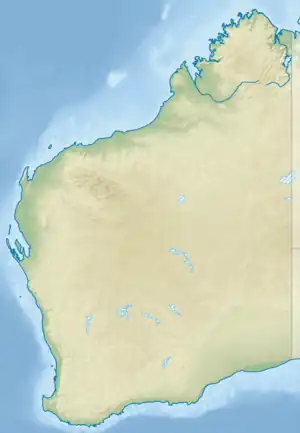Mount Lesueur
Mount Lesueur is a near-circular, flat-topped mesa located 21 kilometres (13 mi) from Jurien Bay in Western Australia. It rises above the surrounding lateritic plain of Lesueur National Park which has eroded away around it.
| Mount Lesueur | |
|---|---|
 | |
| Highest point | |
| Elevation | 313 m (1,027 ft)[1] |
| Coordinates | 30°10′31.8″S 115°11′56.7″E |
| Geography | |
 Mount Lesueur | |
| Parent range | Gairdner Range |
Mount Lesueur was first sighted and named by Europeans as the French ship the Naturaliste sailed past Jurien Bay on its voyage up the Western Australian coast.[2] It was named in honour of Charles Alexander Lesueur, a natural history artist on board the ship. The next recorded sighting was by Captain George Grey, who led a small party through the area in 1839 after they were shipwrecked near Kalbarri.[2] In 1849 a party led by A.C. Gregory ascended Mount Lesueur.[2] They were followed the next year by botanical collector James Drummond on the first of his many visits to the area.[2]
A reserve (No.24275) was created around Mount Lesueur for "educational purposes" in the 1950s.[2] A more extensive area was gazetted as a national park in 1992.[2]
Mount Lesueur has an extremely high level of plant biodiversity, making it of immense research and conservation importance to botanists.
It has been identified with coal geology.[3]
References
- "Mount Lesueur". Gazeteer of Australia. Geoscience Australia. Archived from the original on 5 June 2011. Retrieved 17 July 2009.
- "Management Plan:Lesueur National Park and Coomallo Nature Reserve 1995 - 2005" (PDF). Department of Conservation and Land Management. 1995. Archived from the original (PDF) on 6 April 2011. Retrieved 17 July 2009.
- Suwarna, Nana (1993), Petrology of Jurassic coal, Hill River area, Perth Basin, Western Australia, Curtin University, retrieved 10 October 2023